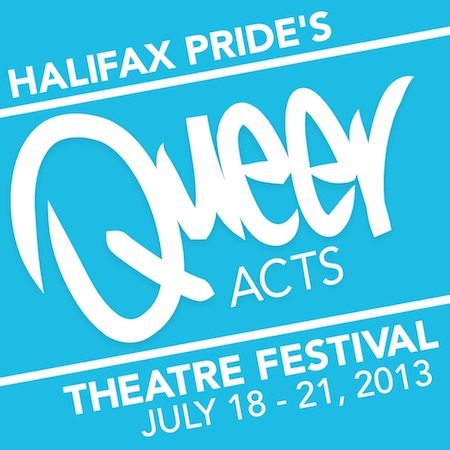In 2009, Halifax Pride started Queer Acts, a theatre festival to run during the annual Pride festivities. Since then, it has grown in leaps and bounds and this year’s crew of actors, playwrights and more are gearing up for another great season.

Down East sat down with Adam Reid, Queer Act’s organizing force.
.
Why is having a theatre fest with a queer bent so important?
Halifax is known as a queer hub for the Maritimes, and that reputation is well earned. We have a diverse and large LGBTQ community, and within that community exists incredibly talented individuals. A queer theatre festival allows LGBTQ artists the ability to tell many of the stories at the forefronts of their minds. The festival allows them to do so in a supportive atmosphere for an engaged, informed, and invested audience. I strongly believe the engagement of the audience is as important as the art. The relationship between artist and audience is a loop whereby one feeds the other. We have an audience who understand the stories being told. They may not have lived through the scenarios they see on stage, but they can relate, and upon leaving the theatre they discuss the shows with each other and the artist in a way that is deeply satisfying for all involved. It is critical that audiences see themselves and their stories reflected on stage, and it is just as critical for artists to have their stories presented for informed audiences.
Tell me about the queer youth program.
I’m very interested in engaging young artists because they tell the stories affecting a large part of the Queer Acts audience. This festival, and all culture, makes a lasting impression on viewers when it reflects their experience. I also want to engage young artists because I need to ensure that new work is always being created. This is a very queer city, but it’s still not a very big one. I need to encourage those living and working here to develop their talent and create new work. With those goals in mind I established the Queer Youth Creations Program. I reserved a slot in the festival for a double-bill by a local youth and a youth from Toronto. I found funds to offer a local young artist the means to create and develop a new work. Then I partnered that artist with a small creative team to help her bring that written piece to the stage. The show is called Seventeen and it was written by Dartmouth high schooler Aisha Sommer Zaman. It’s a funny and thoughtful piece that is going to work extremely well with the second half of the double bill. That show, Graceful Rebellions, was written by Shaista Latif in Toronto as part of Buddies in Bad Times Theatre’s Young Creators Unit. With this double-bill I wanted to offer the public two perspectives and two youthful voices. I think audiences are going to be impressed by what they hear. So while this is the first year of the program, I am very hopeful that it will continue, finding local queer youth, partnering them with a mentor, and then presenting that show alongside another piece from away. It’s an initiative I’m really excited about.
How did the connections with Buddies’ happen?
As the country’s longest running and most prestigious LGBTQ theatre company, I have always looked to Buddies for guidance and inspiration. The first Queer Acts event in 2009 included two shows from Buddies’ Young Creators Unit, so the relationship was established early. Then in 2011 I brought in evalyn parry’s show SPIN. evalyn runs the Young Creators Unit, so we began a series of conversations on how to incorporate more of their work into the festival while engaging Halifax Youth at the same time. I suggested presenting one of the Young Creators Unit shows at Queer Acts alongside a piece by a Nova Scotia based youth. The results have been very positive and I can’t wait to present the resulting work.
How were the playwrights selected?
I select the shows through a submission process that begins in the Fall of each year. I basically spend the whole year speaking with artists, reading different websites, and trying to find out what’s going on and who’s working on which projects. Frequently I will then encourage certain artists to apply, but really, it all comes down to the strength of the application and the piece being submitted. WIth limited time and funds, I can only present a small selection of the plays being submitted each year, and for that reason I try and offer as diverse a selection as possible, covering a variety of themes and styles.
How hard is it to have a Halifax-focused festival? And how important is it?
It’s actually not hard at all. There are so many talented artists working in the city telling such wonderful stories, it’s a bit heartbreaking every year having to select just a few to include. My focus or the bulk of the shows are always going to be locally based as the goal is to develop this city’s reputation for outstanding theatrical performance, but the real challenge is occasionally shifting the focus elsewhere. I’d love to have more shows visiting from away, but that causes a few difficulties. First, bringing in shows is more labour intensive and costly. It takes more of my time, organizing the logistics of an out-of-town show than it does a local one, so that means my energies are consumed by an out-of-town show. Visiting shows also tend to be more expensive to bring. With fees, labour, transport, accommodations etc, they can be costly. And finally, it’s a bit tougher to get an audience for visiting shows. Local artists come with a following and group of supporters interested in seeing their work. Visiting artists don’t always have that fan base. If patrons have limited funds and they have to decide between two shows, they’re going to see the one starring their friend. So, after a year of prep, it can just be heartbreaking to see a fantastic show from away struggling to find an audience. So focusing on Halifax is easy and rewarding but we need to be looking at outside artists too, and learning from the work they are creating.
*
Here’s a sneak peek at what you can see at Queer Acts in the coming days, courtesy of the ladies from Jet Legs

 Why you can trust Xtra
Why you can trust Xtra


